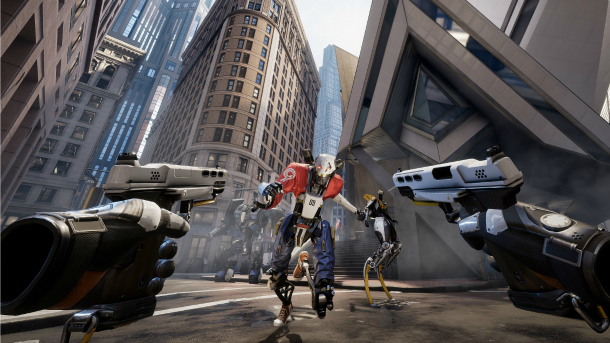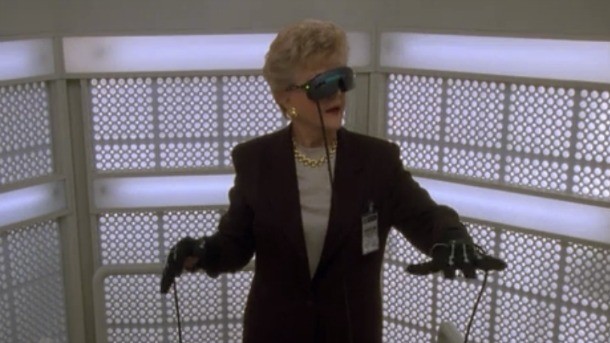Please support Game Informer. Print magazine subscriptions are less than $2 per issue
Opinion: Robo Recall Captures Virtual Reality Gaming’s Triumphs And Failures

Robo Recall, a frenzied shooter that has you taking on a city of haywire robots, was announced back in August at Oculus Connect 3. I remember sitting in the front of the stage, relatively bored with everything Oculus had trotted out. A glorified version of Skype. Some dull-looking demos. A couple of long-winded statements about virtual reality’s supposed impact on the future in gaming as well as other sectors. However, when Epic showed off Robo Recall, and later let me play it for a few minutes, I walked away intrigued by the possibilities of the game.
This was year three in Oculus’ long bid to capture the imagination of the public and gain traction with consumers. The company had lined up a lot of investors and early adopters, but had no software in sight capable of convincing most consumers to shell out money for both the headset and Touch controllers themselves. Robo Recall struck me as the first game that could change that situation; that is, until I learned the game wasn’t even launching with the Touch controllers. Despite Oculus matching the original Gears of War’s budget for the development of its platform-exclusive game and the game clearly being the company’s trump card for the Touch controllers, Robo Recall wouldn’t launch until nearly four months after they shipped the controllers, during a time when everyone’s attention is focused on the likes of Zelda, Switch, Mass Effect, and a slew of other hot topic gaming sessions, which is a shame, because Robo Recall is quite good.
In my review for the game, I spent a fair portion talking about why this goofy sci-fi title is a fantastic shooter where the exhilaration come explicitly from how it uses virtual reality.
The action is intense and always up-close-and-personal. Robo Recall excels at being pure power fantasy, with its simplistic but elegant systems lets players become a sci-fi blockbuster savior in a way that just isn’t possible in non-VR games. Picking up an enemy with my own hands, using him as a shield, and then returning fire with my own weapon is exhilarating. The intimacy of the violence and the demand that I constantly move my hands to orchestrate combos like some violent conductor makes what would be ho-hum action in another game thrilling here.
Despite having played most of the major releases on all three VR headsets, Robo Recall remains the only game I’ve played that’s created an experience where moving around in a space with my body and interacting with the elements in that environment is constantly engaging. Yes, it’s another shooting gallery game that features blink teleportation for getting around the environment, but there’s such creative ingenuity within that small box that despite all my skepticism, I was impressed. It’s a game that makes the difference between using a PS4 controller or mouse to shoot an enemy and using a motion controller and headset feel vast.

I have played many, many non-VR games where I can use foes as meat shields or sidestep their bullets, but physically bending out of the way of the enemy fire is an unprecedented level of immersion for me as is picking an enemy up, ripping their head off, and bowling it into another foe. Robo Recall presents what should be a generic action experience and skillfully makes the case for how these headsets can take the familiar and make it new. The only sticking point is the teleportation system, which is hard to blame Epic for since that’s more of a hardware limitation than anything else. However, having to use my controller to move around instead of my feet creates a disorientation with my upper and lower body and does occasionally draw attention to the the game’s artificiality. Still, technological limitations aside the experience remains, in my mind, the most convincing case for virtual reality yet.
This game should be Oculus’ killer app. However, the company’s strange release, basically sending Robo Recall out to die in the middle of a packed release schedule, instead of with the controllers’ launch back December is another sign of VR’s strange, nebulous place in the gaming industry. Again, I can’t help but think of sitting at the Oculus presentation in August, listening to various developers and executives all make the case for VR in ways that didn’t really come together. Some of them championed the technology for its business possibilities, others for what it could do for gaming or education, seemingly with little care that they had created a souped-up Kinect for an audience that expected the Holodeck. There’s something to be said about unrealistic expectations there but from the very beginning Oculus has tapped into virtual reality’s place in pop culture as an outlandish transportation machine, inviting its Kickstarter backers in 2012 to “step into the game.”
Robo Recall is the title that best lives up to that invitation, but what fanfare is there for it? There’s little discussion of it, reviews continue to trickle in but the game’s been out for nearly two weeks and it just seems like there’s a lot of silence from both players and Oculus itself on the game. This should be the game that is pitched to the wary public as the definitive VR experience, but the push isn’t there at all.
Robo Recall could be a sign that developers are finally stepping out of tech demo territory and are creating more substantial offerings for these expensive headsets, but you’d never know by the game’s unenthusiastic release. Despite my hesitance and skepticism for all things VR, I do want the platform to succeed both for its creative possibilities and to bring the joy of games to a larger audience. However, what hope is there for the platform to take hold with a general audience if there’s no push behind the best experiences these devices have to offer?










